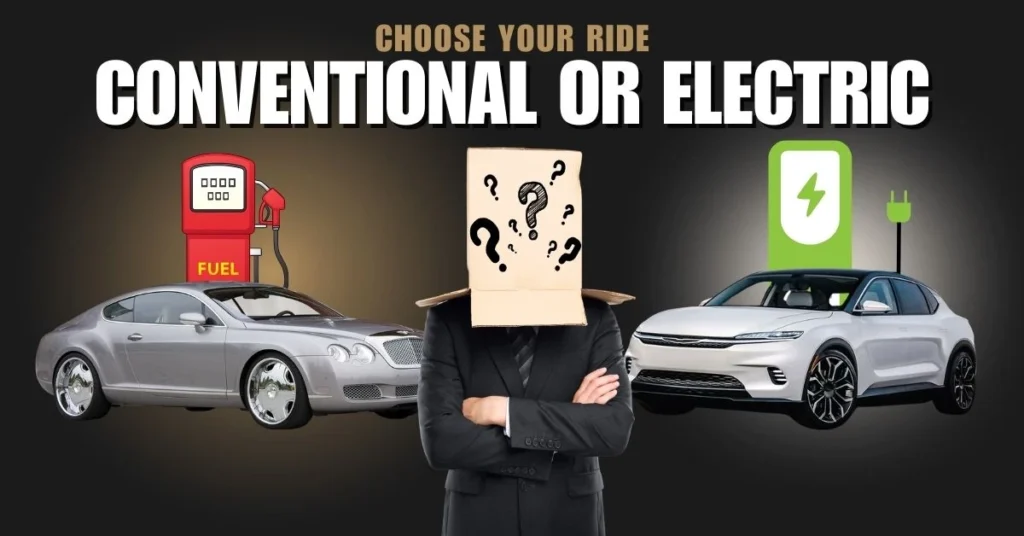Fueling the Future: Conventional Cars Vs Electric Cars
Table of Contents
ToggleThinking of buying a new car but confused about which one to purchase? Be it a conventional ( Internal Combustion Engine) car or an electric vehicle. Here is how you can outline the most common difference between both. Each option comes with its own merits and demerits. Let’s break it down into key differences so you can decide on the kind of vehicle that would fit your style, giving you all the insights to choose the ultimate among both the vehicles that will complement your lifestyle in every way.
Evolution Electric vehicles and Internal Combustion Engine vehicles
Evolution electric vehicle and Internal Combustion Engine Vehicle. The transition from Internal Combustion Engine Car to conventional Cars is transforming the automobile industry. Conventional cars are run by an Internal Combustion Engine, emitting about 4.6 metric tons of CO₂ per year that depend on limited use of fossil fuels, leading to climate change. For this reason, EVs produce zero tailpipe emissions, are up to three times more energy-efficient, and have lower running costs that save owners $800-$1,000 annually.
Choose Your Next Ride: Electric Cars Vs Gas Cars
The shift from conventional car to electricity represents a broader change in how we think about transportation, sustainability, and the future of our planet. So let’s dive into a detailed comparison between conventional cars and electric vehicles.
Environmental Impact
Conventional cars emit GHGs like carbon dioxide, causing air and climatic changes. The fumes of such cars also contain harmful particles deteriorating the quality of air. While on the other side, electric cars do not have tailpipe emissions and thus are much safer and eco-friendly to keep the atmosphere clean. But again, environmental impact would vary with the fact that how the required electricity to charge your car is generated. Renewable energy resources drastically reduce the carbon footprint caused by EVs.
Fuel efficiency and performance
A key difference between conventional cars and electric vehicles is fuel efficiency. Electric vehicles are more efficient compared to the Internal Combustion Engine cars. In electric cars, up to 60% of the electrical energy stored in the battery can be converted to power at the wheels, reducing the cost of electricity compared to the fuel cost of conventional cars. Thus, electric vehicles are more efficient compared to traditional ones.
Electric AC for any vehicle universal
Powered with an electric AC for any vehicle, the universal system is a versatile solution designed to provide cooling for a wide range of vehicles. These systems operate using an electric compressor, making them efficient and independent of the engine’s operation. Electric vehicles (EVs) and conventional cars differ in their air conditioning (A/C) systems. In traditional vehicles, the A/C compressor is powered by the engine, utilizing engine-driven compressors. On the other hand, EVs employ electric compressors powered directly by the vehicle’s battery, allowing for more efficient and independent operation.
Operating Costs
The Electric vehicles require less maintenance than traditional cars due to having fewer moving parts that are prone to wear and damage. This reduction in parts makes less likely to experience frequent repairs, leading to lower overall maintenance costs and less time spent to fix it.
Maintenance Costs
There is a transformative shift in the automotive industry as the electric vehicle is becoming popular with the increasing time. Since ages EVs are known for its eco-friendly benefits and are praised for their cutting-edge technology. One of their advantages lies in their lower maintenance costs. So, let’s dive into how maintenance costs differ between conventional Internal Combustion Engine cars and EVs without pinching your pockets. The maintenance cost gap between conventional cars and EVs becomes more apparent over time:-
Conventional Cars
- The complexity of Internal Combustion Engine vehicles leads to higher costs for parts and labor. For example, replacing a timing belt or fixing an exhaust system can run into hundreds or even thousands of dollars.
- Average annual maintenance cost: $900–$1,200.
Electric Vehicles
- With fewer moving parts, EVs avoid many of the common issues that plague Internal Combustion Engine vehicles. The most significant potential cost battery replacement—is rare and often covered under warranty for the first 8–10 years.
- Average annual maintenance cost: $300–$600.
Understanding Vehicle Electric Repair
Vehicle electric repair involves the diagnosing and fixing of issues related to the electrical system of a car, including the battery, alternator, starter motor, and wiring. Regular inspecting and prompt repair can help catch small issues before it turns out to a major problem. A proper vehicle electric repair requires skilled technicians who can identify the faults, replace faulty components and ensure the electrical system operates efficiently and systematically. These repairs can prevent electric failures and extend the lifespan of your vehicle’s electrical components.
Electric Vehicle Vibration and Battery
Electric vehicles (EVs) have become increasingly popular due to their efficiency and eco-friendliness. However, one aspect that is often overlooked is the vibration associated with the vehicle and its impact on the battery. Excessive electric vehicle vibration can cause stress on the battery, leading to issues like low efficiency, shorter lifespan, and excessive wear on internal components. With regular maintenance, including checking the suspension system and ensuring proper tire balance, can help minimize the effects of electric vehicle vibration shocks and protect the battery.
Electric Vehicles in DFW: Crafting a sustainable future.
The electric vehicle DFW area has become one of the major regions promoting electric vehicles (EVs). The increased knowledge about environmental issues is driving a shift among DFW residents towards electric cars to contributing to a greener future. DFW area are opting for electric cars to reduce their carbon footprints. It also reduced emissions and opened the door for a sustainable future. As more people in DFW area switched from gasoline-powered vehicles to electric vehicles, the region witnessing significant changes leading to transportation, better charging options, and more community efforts to protect the environment.

Electric Cars Vs Gas Cars: Which is Better for You?
Electric Cars Vs Gas Cars is the main debate gaining momentum these days, as most people focus on eco-friendly options. EVs are taken as much kinder to the environment in comparison to the gas cars, which rely on burning fuel and release harmful pollutants. While the gas cars may be budget-friendly initially, electric vehicles save money over time with lower fueling and maintenance costs. The EV Vehicles provide a jerk-free ride and quick acceleration, while the gas cars provide easy fueling but are not environment-friendly. However, in cities like DFW, where the structure for the charging of EV is developing at a very rapid pace, an electric car has now become more practical for daily use. It depends on individual needs, but as technology advances, electric cars will soon become the smarter choice for many gearheads, especially with an increasing focus on sustainability.
Conclusion
The choice between the Conventional Cars and Electric Cars can depend on the personal choice of the individual. Electric cars are better for those who want to reduce their environmental impact, spend less on maintenance and enjoy the latest technology. On the other hand, the conventional cars offer you various advantages like longer driving range, fewer charging station and a quick refueling making them a good choice for long trips. These cars are especially ideal for the ones looking for reliability and affordability.
At Tagore Automotive, we pride ourselves on bringing you nothing but the best of quality used engines and used transmissions so that you could keep running your conventional car smoothly and effectively. Be it reliability, value for money, or expert support-rely on us with your expectations.
FAQs
Q1. Which is better, an electric car or a normal car?
Ans. Electric cars are eco-friendly and are less cost effective however, a normal car offer longer ranges and have a higher up front cost and impact on environment.
Q2. What are the disadvantages of EV?
Ans. There are various disadvantages of EV including:
- EVs generally have a shorter range than traditional gasoline vehicles, usually between 200 to 300 miles per charge.
- EVs can take a consider amount of time to charge their battery usually the charging takes up to 20 minutes or more depending on the charger.
- EVs are eco-friendly but the materials that are used to make the car and the batteries and the process through which the electricity is produced can impact the environment.
- These cars have lower resale value than gasoline powered cars.
- Over time batteries may degrade in these vehicles leading to lower range.
Q3. Will gas cars be around in 5 years?
Ans. Yes, gas cars will be around in next 5 years. As these may remain in use due to their durability, widespread availability and advanced technology.
Q4. What will happen to classic cars when gas is banned?
Ans. When gas is banned classic cars can face fuel availability issues, higher maintenance cost and government may also impose stricter emission standards and higher maintenance cost.
Q5. Do electric cars cost more than regular cars?
Ans. Yes, due to its advanced technology and battery involved the electric cars are more expensive than the traditional gasoline-powered cars.
Q6. Do electric cars increase your electric bill?
Ans. Yes, electric cars can increase your electric bill as the following factors are responsible for it.
- How often you charge: The more you charge the more electricity it will consume.
- The size of the battery: The battery which are larger in size requires more power consumption.
- Your local electricity rates: charging your EVs during peak hour can increase your billing charges.
- Charging Method: Fast charging will draw more power in a shorter time leading to high bill cost.
Q7. What is the annual mileage standard for electric vehicles?
Ans. On average the annual mileage standard for electric vehicle is around 7,000 miles-15,000 miles depending on the driving habits, battery capacity and weather conditions.
Q8. Why battery protection matters in electric vehicle?
Ans. Battery protection in electric vehicles is crucial to prevent overcharging, overheating, and deep discharge, ensuring optimal performance and longevity.

